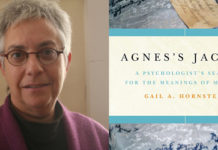The Persistence of the Radioactive Bogeyman
From Bulletin of the Atomic Scientists: Since 1950, a noteworthy number of American and European horror movies have used radiation as a plot device. The...
First-Person Accounts of Madness and Global Mental Health: An Interview with Dr. Gail Hornstein
Dr. Gail Hornstein, author of Agnes’s Jacket: A Psychologist’s Search for the Meanings of Madness, discusses the importance of personal narratives and service-user activism in the context of the global mental health movement.
Editorial Takes On Conflicts of Interest and Propaganda in Psychiatry
In a scathing editorial in this month’s Psychotherapy and Psychosomatics, Dr. Giovanni Fava takes aim at prominent medical experts who have downplayed the role...
How Dissenting Voices are Silenced in Medicine
Researcher criticizes the many ways opposing viewpoints and dissenting voices are squashed in the field of medicine.
Review Questions Long Term Use of Antipsychotics
Patients who recover from a single episode of psychosis are often prescribed antipsychotics long-term, despite a lack of evidence for this practice
Why Some Children with Depressed Parents Show Resilience
Children of parents who suffer from depression have a severely heightened risk of mental health problems, but new research points to several factors that seem to strengthen young peoples’ resilience and predict good mental health.
“Tasty and Easy to Take, A New ADHD Drug Alarms Some Psychiatrists”
For STAT, Meghana Kashavan reports on a new, candy-flavored, chewable, fruity, amphetamine drug on the market for children diagnosed with ADHD. “It’s a move...
Researchers Find Inadequate Reporting of the Dangers of Ketamine Treatment for Depression
Researchers report that dangerous side effects are not being adequately reported in the trials of ketamine for depression.
JAMA Editorial: “Confluence, Not Conflict of Interest”
Yesterday, the Journal of the American Medical Association (JAMA) released an editorial entitled “Confluence, Not Conflict of Interest: Name Change Necessary.” The authors argue that the phrase “conflict of interest is pejorative,” and a better term “would be confluence of interest, implying an alingnment of primary and secondary interests.”
“The New York Times and the ADHD Epidemic”
-MIA Bloggers Jonathan Leo and Jeffrey Lacasse review the New York Times' history of reporting on ADHD and the ensuing epidemic of ADHD.
“How Too Much Medicine Can Kill You”
In an op-ed for the Guardian, cardiologist Aseem Malhotra writes: “Corporate greed and systematic political failure have brought healthcare to its knees. There are too many misinformed doctors and misinformed patients. It’s time for greater transparency and stronger accountability, so that doctors and nurses can provide the best quality care for the most important person in the consultation room – the patient.”
“Pharma Executives Worry About Presidential Candidates Demanding Reform”
Reporting for The Intercept, Lee Fang reveals that pharma executives "have told investors that they are working actively to influence the political debate.” After...
Antidepressants During Pregnancy Increase Risk of Psychiatric Diagnosis in Children
New research, based on data from almost a million children in Denmark, suggests that children of mothers who use antidepressants during pregnancy are more likely to be diagnosed with autism and psychiatric disorders.
“Drug Trials Not Reported in Line with Ethical and Legal Demands”
“Decisions about the effectiveness of drugs are being made with incomplete information because results of almost three-quarters of clinical trials are still not published...
Researcher Critiques Misleading Media Coverage of Lancet Antidepressant Meta-Analysis
The BMJ’s clinical editor takes issue with uncritical media coverage of antidepressant network meta-analysis, outlining reporting missteps.
Psychologist Rethinks Psychotropic Medications, Calls for Renewed Dialogue
Psychologist and Professor Amber Gum has published the story of her personal journey of rethinking psychotropic medication in a special issue on "The Politics of Mental Health" in The Journal of Medicine and the Person. Influenced by Mad in America and the work of Robert Whitaker, Gum became aware of evidence that “suggests that psychotropic medications are less effective and more harmful than most believe” and now hopes to encourage other mental health professionals and researchers to engage in open-minded, critical self-assessment of standard practices.
The P-Value Problem in Psychiatry
Stanford researcher writes that readers should check the effect size of results instead of looking at the p-value.
“A Decade of Questions over a Paxil Study Vindicated”
Martha Rosenberg calls the reanalysis of Paxil and Study 329 “a victory for safety activists, medical reporters, the public and freedom of the press.” But, she warns, “many pro-pill doctors continue to fight evidence of Paxil’s suicide risks and similar SSRIs.”
“A Creative Solution for Psychology’s Replication Problem”
In the Atlantic, Ed Yong reports that despite the lack of replicability of individual studies, when you get a pool of psychologists “betting on” the reproducibility of a study their predictions are surprisingly accurate. “Which makes me wonder: What's going on with peer review? If people know which results are really not likely to be real, why are they allowing them to be published?”
Massive Reforms for Pharmaceutical System Proposed
The US/Canadian Pharmaceutical Policy Reform Working Group proposes universal drug coverage and ambitious reforms to the pharmaceutical system.
Video Documentary About the Controversial Topics
From London City Psychotherapy: Between January 1943 and May 1944, the British Psychoanalytic Society held ten meetings to resolve major disagreements over the theory, practice, and...
New York Times Issues Correction on RAISE Study Report
Last Tuesday, The New York Times and several other outlets (including Mad In America) reported on the highly-touted results of a study on psychosocial treatment for patients diagnosed with schizophrenia. Now, claims made about the study, which the ‘Times called “the most rigorous trial to date,” are coming under increased scrutiny.
Does Active Placebo Response Explain Antidepressant Results?
A new study investigated whether participants guessing if they have an antidepressant or placebo affects response rates.
Screen Time Linked to Increased Depressive Symptoms Among Teens
New study examines how increased screen time and social media may be contributing to depressive symptoms and suicide risk in teens
How Do Clients Solicit Medication Changes With Psychiatrists?
Researchers examine psychiatrist-client interactions and find that clients are often left with few opportunities to make explicit requests to change their medication regimen.






















